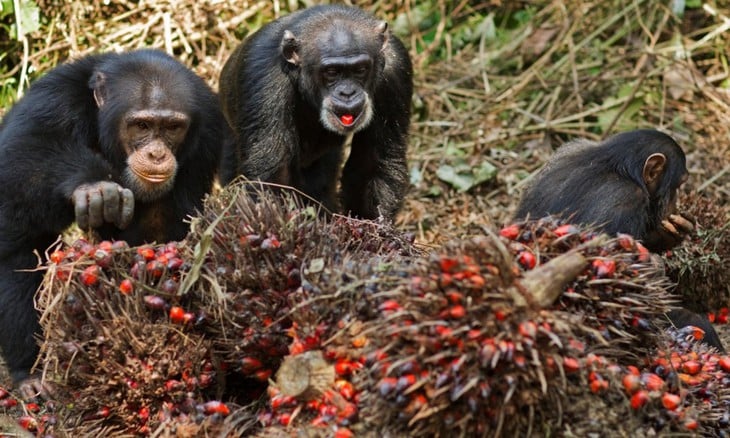
A group of chimpanzees drinking fermented tree sap in the Nzerekore region, southeastern Guinea - Photo: THE GUARDIAN
According to National Geographic magazine and Vietnam News Agency, research published in Science Advances magazine on September 17 shows that chimpanzees consume quite a lot of "alcohol" through food.
The study was based on an analysis of more than 500 types of fruit found around chimpanzees, their daily food intake, and the time they spent eating different types of fruit.
Scientists collected the fruit the chimps ate and measured the ethanol content, which is formed when sugars are fermented. They concluded that the primates consumed about 14 grams of alcohol per day.
On average, a chimpanzee consumes about 14-15 grams of alcohol per day. However, because chimpanzees weigh much less than humans, that amount of alcohol is equivalent to about 25 grams of alcohol for them (equivalent to 2 cans of beer).
“These are not small amounts, but they are highly diluted and associated with food,” said Aleksey Maro, a graduate student at the University of California, Berkeley, and lead author of the study.
The results support the “drunken monkey hypothesis” proposed by biologist Robert Dudley more than a decade ago, which suggests that humans’ preference for and ability to metabolize alcohol originated from primate ancestors who consumed alcohol daily through fermented fruit. “It’s a bit of a misnomer,” Maro says. “Maybe it’s better called ‘evolutionary hangovers.’”
Initially, this hypothesis was met with skepticism, but gradually received support when many studies showed that primates not only ate fermented fruit but also preferred nectar with higher alcohol concentrations.
Professor Nathaniel Dominy (Dartmouth College), who was not involved in the research, called the work "groundbreaking" and said it "closed the debate on the prevalence of ethanol in tropical fruits".
However, the study also raises new questions: what biological and behavioral effects does chronic exposure to low concentrations of alcohol have on chimpanzees, and do they actively seek out alcohol-containing fruits or just eat them when they come across them?
According to Maro, further research into this behavior will help to better understand the origins of human alcohol consumption, as well as the potential risks and benefits. "We can learn about ourselves from chimpanzees," he concludes.
Source: https://tuoitre.vn/so-thich-nhau-nhet-cua-con-nguoi-bat-nguon-tu-tinh-tinh-20250918173834331.htm


![[Photo] The road connecting Dong Nai with Ho Chi Minh City is still unfinished after 5 years of construction.](https://vphoto.vietnam.vn/thumb/1200x675/vietnam/resource/IMAGE/2025/11/04/1762241675985_ndo_br_dji-20251104104418-0635-d-resize-1295-jpg.webp)

![[Photo] Panorama of the Patriotic Emulation Congress of Nhan Dan Newspaper for the period 2025-2030](https://vphoto.vietnam.vn/thumb/1200x675/vietnam/resource/IMAGE/2025/11/04/1762252775462_ndo_br_dhthiduayeuncbaond-6125-jpg.webp)

![[Photo] Ho Chi Minh City Youth Take Action for a Cleaner Environment](https://vphoto.vietnam.vn/thumb/1200x675/vietnam/resource/IMAGE/2025/11/04/1762233574890_550816358-1108586934787014-6430522970717297480-n-1-jpg.webp)
![[Photo] Ca Mau "struggling" to cope with the highest tide of the year, forecast to exceed alert level 3](https://vphoto.vietnam.vn/thumb/1200x675/vietnam/resource/IMAGE/2025/11/04/1762235371445_ndo_br_trieu-cuong-2-6486-jpg.webp)















![[INFOGRAPHIC] HP OmniBook 7 Aero 13”, smart security](https://vphoto.vietnam.vn/thumb/402x226/vietnam/resource/IMAGE/2025/11/04/1762263280437_info-hp-02-jpg.webp)

















































































Comment (0)